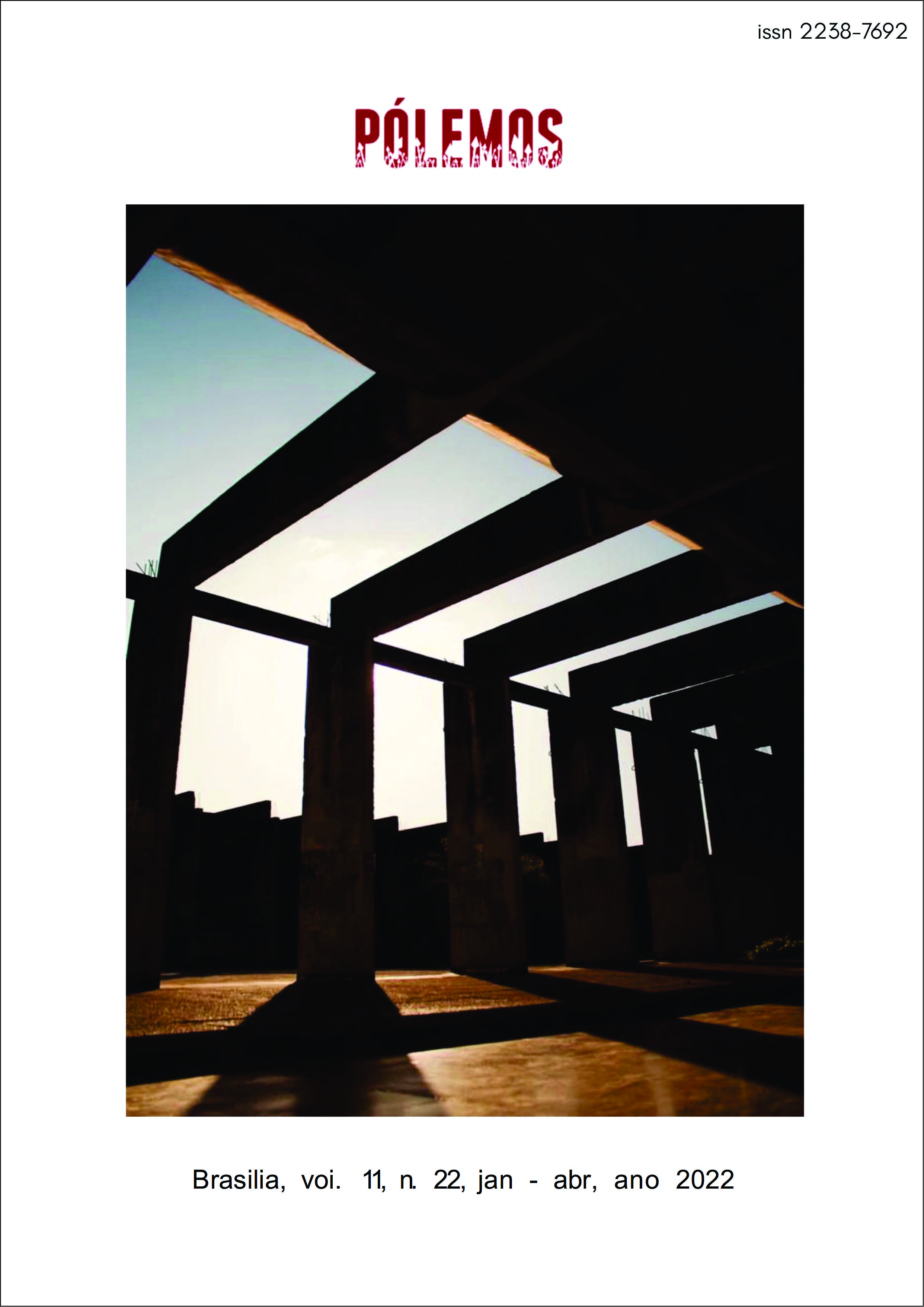THE CENTRALITY OF FIRE IN THE COSMOGONY OF THE PYTHAGOREAN PHILOLAUS
DOI:
https://doi.org/10.26512/pl.v11i22.41781Keywords:
Ancient philosophy. Philolaus. Cosmogony. Central Fire. Hestia.Abstract
Philolaus of Croton is historically situated in the archaic period of philosophy, however, unlike other philosophers of this period, the Pythagorean always appears in a superficial way in works of archaic philosophy introduction. This peripherical role of Philolaus in the tradition is incongruent, since he is a philosopher that permeates Platonic and Aristotelian works, being cited explicitly in the Phaedo. Plato himself was accused of having plagiarized the philolaic system in the Timaeus. Philolaus had an extremely sophisticated philosophical system for his era, in which the metaphysic is based on dissimilarity and harmony and an epistemology based on number. Nevertheless, this paper is not limited to thinking only about the more “scientific” aspects of Philolaus, but also aims to understand the context in which he lived and how the practice of rites and myths influenced his philosophical work.
This paper will be dedicated more specifically to the comprehension of the fragment 44 DK B7, which the center of Philolaus’ cosmos is said to be called Hestia or hearth. Hestia was known as the virgin goddess of the home; the hearth is her symbol. It was verified the references to the goddess in the literature, rites dedicated to her symbol in private and public spaces, such as the megaron, and their possible correspondences to the philolaic system based on an hermeneutical reading.
Downloads
References
ANGIONI, Lucas. Aristóteles. Metafísica: Livros I, II e III. (Trad) Clássicos da Filosofia: Cadernos de Tradução nº 15. Campinas: UNICAMP, 2008.
BARNES, Jonathan. The Presocratic Philosophers. London., 1982.
BIERS, Willian R. The Archaeology of Greece: An Introduction. Ithaca, NY: Cornell University Press, 1996.
BURKERT, Walter. Lore and Science in Ancient Pythagoreanism. Trad: E. Mina. Cambridge, 1972.
CORNELLI, Gabriele. As origens pitagóricas do método filosófico: o uso das archai como princípios metodológicos em Filolau. Hypnos, v. 11, p. 71-83, 2003.
CORNELLI, Gabriele. O Pitagorismo Como Categoria Historiográfica. São Paulo: Annablume., 2011.
CROSS, Nicholas D. The Hearth as a Place of Refuge in Ancient Greece. Pallas, v.112, p. 107-123, 2020.
DALIMIER, Catherine; PELLEGRIN, Pierre. Aristóteles. Traité du Ceil (trad) in Œuvres Complètes. Direction de Pierre Pellegrin. Éditions Flammarion, Paris, 2014.
DUMONT, Jean-Paul. Elements de l’histoire de la philosophie antique. Paris: Nathan Université., 1993.
FRANK, Erich. Plato und die Sogenannten Pythagoreer: ein Kapitel aus der Geschichte des grieschichen Geistes. Halle (Saale): Max Niemeyer, 1923.
GRAVES, Robert. Greek Gods and Heroes. New York: Doubleday & Company, Inc, 1960.
HEIDEGGER, Martin. Introdução à Metafísica. Trad: Emmanuel Carneiro Leão. 4ª ed. Rio de Janeiro: Tempo Brasileiro, 1999.
HUFFMAN, Carl. Philolaus of Croton. Cambridge University Press, 1993.
HUFFMAN, Carl. Philolaus And the Central Fire in Reading Ancient Texts. Volume I: Presocratics and Plato. p.58-94. Leiden, The Netherlands: Brill, 2008.
HUFFMAN, Carl. "Philolaus", The Stanford Encyclopedia of Philosophy. Disponível em: https://plato.stanford.edu/archives/sum2016/entries/philolaus/.
KAHN, Charles H. Pythagorean Philosophy Before Plato in The Pre Socratics: A Collection of Critical Essays edited by Alexander P.D Mourelatos. p.161-185. Princeton University Press, 1994.
KAHN, Charles H. Anaximander and The Origins of Greek Cosmology. New York: Columbia University Press, 1960.
KAHN, Charles H. Pythagoras and the Pythagoreans, Indianapolis: Hackett, 2001.
KINGSLEY, Peter. Ancient Philosophy, Mystery and Magic Empedocles and Pythagorean Tradition. New York: Oxford University Press, 1995.
KIRK, Geoffrey; RAVEN, John E.; SCHOFIELD, Malcom. The presocratic philosophers: a critical history with a selection of texts (2nd ed.). Cambridge: Cambridge University Press, 1983.
KURY, Mário G. Diógenes Laércio. Vidas e Doutrinas dos Filósofos Ilustres. (Trad) 2ª ed. Brasília: Editora da Universidade de Brasília, 2014.
LAKS, André. Introdução à “Filosofia Pré-Socrática”. Trad: Miriam Campolina Diniz Peixoto. São Paulo: Paulus, 2013.
MCKIRAHAN, Richard D. A Filosofia Antes de Sócrates: uma introdução com textos e comentários. Trad: Eduardo Wolf Pereira. São Paulo: Paulus, 2013a.
MCKIRAHAN, Richard D. Philolaus on Number in On Pythagoreanism, edited by Gabriele Cornelli, Richard McKirahan and Constantinos Macris, Berlin, Boston: De Gruyter, pp. 179-202, 2013b.
ROSA, Edvanda B. et al. Hinos Homéricos. São Paulo: Editora UNESP, 2010.
SARIAN, Haiganuch. Arqueologia da Imagem: Aspectos Teóricos e Metodológicos na Iconografia de Héstia. Rev. Do Museu de Arqueologia e Etnologia. São Paulo, Suplemento 3: p.69-84, 1999.
STOCKS, John L. Aristóteles. On The Heavens (trad) in The Complete Works of Aristotle I by Jonathan Barnes. Princeton University Press, Princeton, NJ, 1991.
TORRANO, Jaa. Hesíodo. Teogonia (trad). São Paulo: Iluminuras, 1991.
VERNANT, Jean-Pierre. (1990) Mito e Pensamento Entre os Gregos: estudos de psicologia histórica. Trad: Haiganuch Sarian. Rio de Janeiro: Paz e Terra.
WERNER, Christian. (2018). Homero. Odisseia (trad). São Paulo: Ubu Editora.
YEBRA, Valentin G. (1998). Aristóteles. Metafísica (trad). Madrid: Editorial Gredos.
ZELLER, Eduard; MONDOLFO, Rodolfo. (1938). La Filosofia dei Greci nel suo Sviluppo storico. I Presocratici. Ionici e Pitagorici. Trad: R. Mondolfo. La Nuova Italia, Firenze.
ZHMUD, Leonid. (1989) All is Number? Phronesis, v. XXXIV13, p. 270–292.
Downloads
Published
How to Cite
Issue
Section
License
Copyright (c) 2022 PÓLEMOS – Revista de Estudantes de Filosofia da Universidade de Brasília

This work is licensed under a Creative Commons Attribution-NonCommercial-NoDerivatives 4.0 International License.
Todos os trabalhos que forem aceitos para publicação, após o devido processo avaliativo, serão publicados sob uma licença Creative Commons, na modalidade Attribution-NonCommercial-NoDerivatives 4.0 International Public License (CC BY-NC-ND 4.0). Esta licença permite que qualquer pessoa copie e distribua a obra total e derivadas criadas a partir dela, desde que seja dado crédito (atribuição) ao autor / Ã autora / aos autores / às autoras.


